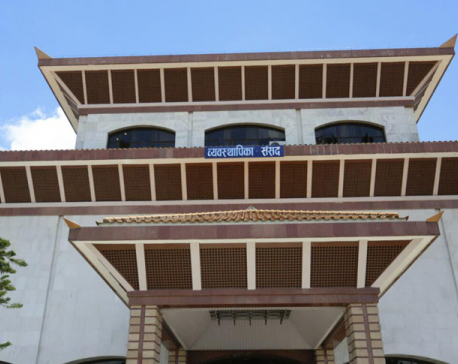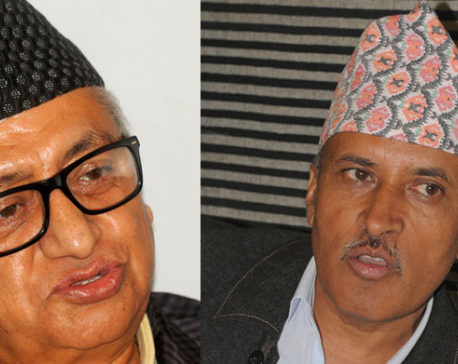
OR
Security agencies reluctant to divulge on facilities given to ex-brass: House Panel
Published On: June 21, 2016 01:35 AM NPT By: Sangeet Sangroula | @SangeetJourno
KATHMANDU, June 21: A sub-committee formed under the Good Governance and Monitoring Committee of Parliament to study the facilities provided to former ranking officials has stated that the former top brass of all the three security agencies--Nepal Police, Armed Police Force and Nepal Army--have been misusing the facilities provided them by the government.
Details submitted by the Nepal Army to the sub-committee show that the army has been providing security and other facilities to as many as 191 former senior officers. "We believe that the number of former officers seeking security as well as other facilities may be higher," said lawmaker Janak Raj Joshi, coordinator of the committee.
According to the sub-committee report, six security personnel each have been deployed for the security of seven ex-chiefs of the army, four security personnel each have been deployed for 13 former IGPs of Nepal Police, and five personnel each for the six ex-IGPs of the Armed Police Force. As many as 122 security personnel have been deployed for the security of former security agency chiefs.
"Not only the former chiefs but other brass have also been enjoying the security facilities as well as other facilities," Joshi said.
Lawmakers in the sub-committee said that apart from the large number of security personnel deployed for the security of former brass, the latter have also been misusing facilities such as vehicles and drivers, fuel and maintenance as well as housekeeping staff.
The lawmakers said that former top officials of the Nepal Army from the chief of army staff down to retired lieutenant generals, major generals, brigadiers, colonels, lieutenant colonels and majors and former IGPs, AIGs, DIGs, SSPs and other officials of Nepal Police and the Armed Police Force have also been enjoying security as well as other facilities from the government.
"The retired security officials are already getting pensions from the government. On top of that, they are seeking security as well as other facilities. Thus, they are enjoying double facilities from the government and misusing taxpayer money," lawmaker Joshi said.
He further said that the security agencies are withholding details about the facilities provided to former brass. "We asked all the three security agencies to furnish details about the facilities being provided to their former top officials. But they just sent figures for the number of security personnel deployed for their security although the former officials are also enjoying various other facilities," he said.
The sub-committee in its report stated that former top security officials of all three agencies have been quietely misusing security personnel for household chores but the agencies have been reluctant to give any details.
The sub-committee had asked all three agencies to furnish details of the facilities being provided to former top brass and do so by June 14, but Nepal Police and the Armed Police Force turned a deaf ear to the sub-committee's request. The army sent the details but only three days after the deadline and the details were also incomplete, it is stated.
Lawmakers accused the security agencies of trying to hide the facilities being provided to former officers. They even alleged that the security agencies are hiding the details as there was massive misuse of such facilities.
The nine-member panel has recommend to the full committee to pass a resolution taking the security agencies to task for their reluctance in submitting the details.
You May Like This

Sky-blue is the colour of House of Representatives and red that of Upper House
KATHMANDU, Jan 3: The Legislature-Parliament Secretariat is using different colours of upholstery and carpet to refurbish the House of Representatives... Read More...

House panel directives to bring Disaster Resilience Development Policy
KATHMANDU, July 10: The Development Committee of Legislature-Parliament has directed the government to bring Disaster Resilience Development Policy soon. ... Read More...

House panel approves Upadhyay, Paudel as envoys to India, China
KATHMANDU, Oct 2: The Parliamentary Hearings Special Committee (PHSC) on Sunday endorsed the recommendations of Deep Kumar Upadhyay and Leela Mani... Read More...











Just In
- Challenges Confronting the New Coalition
- NRB introduces cautiously flexible measures to address ongoing slowdown in various economic sectors
- Forced Covid-19 cremations: is it too late for redemption?
- NRB to provide collateral-free loans to foreign employment seekers
- NEB to publish Grade 12 results next week
- Body handover begins; Relatives remain dissatisfied with insurance, compensation amount
- NC defers its plan to join Koshi govt
- NRB to review microfinance loan interest rate







Leave A Comment